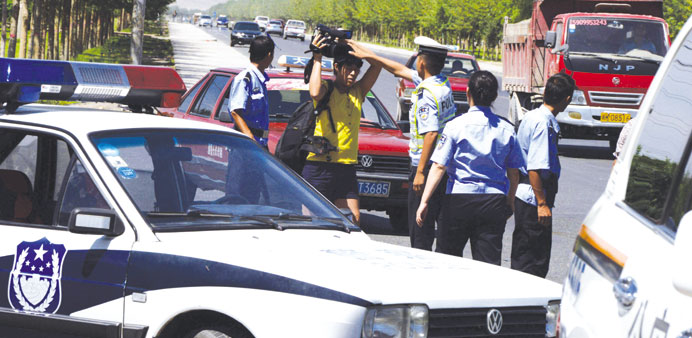Chinese police detain a journalist at a checkpoint on the road to the riot-affected Uighur town of Lukqun, Xinjiang province yesterday.
AFP/Turpan
Fresh violence erupted in China’s restive Xinjiang yesterday, state media said, two days after 35 died in what the government called a “terrorist attack” and a week before the anniversary of major 2009 clashes.
The incident in Hotan city followed riots Wednesday that were the deadliest to hit the western desert region, home to 10mn mostly Uighur Muslims, since violence on July 5, 2009, left hundreds dead.
“At local time this afternoon, a violent attack occurred in Hotan city,” the CCTV state broadcaster said on an official microblog account.
“Currently the incident has been resolved and the number of casualties is being verified.”
It did not provide further details. Several Hotan government and police phone numbers appeared not to be working and the Xinjiang information chief could not be immediately reached.
It was unclear if this week’s incidents, which occurred more than 1,000 kilometres apart, were connected.
Some in the Uighur community have blamed unrest on economic inequality and religious repression - claims that China rejects, pointing to regional investment and placing the blame instead on “terrorists”.
The Xinhua news agency said that in Wednesday’s riots in Turpan city’s Lukqun township, “knife-wielding mobs” attacked police stations and set fire to cars before officers opened fire.
The clashes left 35 dead including 11 rioters, while a further 21 police and civilians were injured and four rioters detained, the report said. “We defined the attack as a violent terrorist attack,” foreign ministry spokeswoman Hua Chunying said of Wednesday’s violence during a regular press briefing in Beijing.
The US-based Radio Free Asia reported a higher death toll of 46, also including 11 rioters, citing officials and residents.
A spokesman for the World Uyghur Congress, a group run by Uighurs in exile, said 67 people had been detained over the Lukqun incident.
In a statement the group called the event “evidence of China’s failed policies towards Uighurs”.
It added that “an information blackout and security crackdown” in the area raised questions about the state media’s version of events.
China closely restricts information about unrest in Xinjiang, and blocked access across the region for several months after the violence in 2009.
The ramped-up security in Lukqun apparently impacted road traffic and communications.
A resident of Turpan said yesterday that his phone calls and text messages to friends in Lukqun could not get through.
Local authorities followed two AFP journalists in their car and detained them for about an hour, stressing that the site of the attacks was closed to media.
A day earlier police at a checkpoint 40 kilometres from Lukqun barred the reporters from entering, citing safety fears and ongoing investigations.
The state-run Global Times said all vehicles entering and leaving the area were “subject to searches in an attempt to track down those still at large”.
It said Xinjiang authorities were preparing for potential disturbances ahead of next week’s anniversary of the 2009 clashes, which involved Uighurs and ethnic majority Han in the regional capital, Urumqi.
Official figures show that 46% of Xinjiang’s population is Uighur, while another 39% are Han. Millions of Han have relocated to the region in recent decades to find work, in a settlement drive that has caused friction in the community.
Similar tensions have arisen in Tibet, which neighbours Xinjiang to the south and is also home to a sizeable Tibetan ethnic group.

